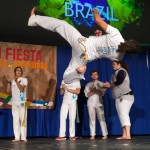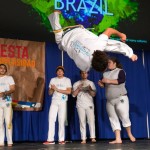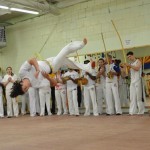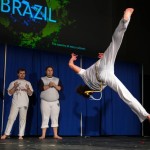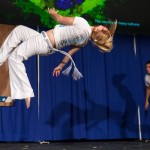The BYU Brazilian Capoeira Club is hard to pronounce but is gaining popularity by giving students an educational, cultural and athletic experience.
The origins of capoeira (pronounced cap-oo-air-a) are fairly mysterious. The origins of this distinctive martial arts style can be traced back to 16th-century Brazil, when slaves were imported by the Portuguese. The slaves’ desire to fight oppression resulted in the creation of capoeira.
“It helped them metaphorically,” BYU senior and club president Nery Ralon explained. “They were able to put their energy and emotions into a new outlet. It was also a literal fight of oppression; they were were able to disguise their martial arts training through dance.”
The origins of capoeira as a BYU club are a lot less mysterious. The club was formed more than 20 years ago as a vehicle for students to learn a new culture.
“The easiest description of capoeira is that it’s a Brazilian martial art that incorporates dancing, gymnastics and fighting,” Ralon said.
Those three elements become obvious as club members begin practicing one-handed cartwheels, jump-kicks, and a variety of other acrobatics to the beat of the traditional music the Brazilian slaves would use.
BYU graduate Celeste Lara began participating in the club more than 10 years ago. There she was first introduced to capoeira and now owns her own capoeira studio with her husband. The couple comes to instruct BYU students each week during club nights.
“Capoeira allows you to meet so many people; your world is just opened,” Lara said. “I’ve traveled all over the states going to workshops and teaching workshops and have been able to meet so many great people.”
Students with any level of experience are welcome to join and receive the professional instruction. Freshman Brayden Miller had a positive experience when he stopped by the club for the first time on Feb. 17.
“It’s different. I haven’t seen a lot of martial arts like this,” Miller said. “It’s an exciting atmosphere.”
The Capoeira Club offers students professional instruction, a fun atmosphere and an opportunity to learn about a Brazilian culture.
“Every person can internalize something from it,” Ralon said. “If you want to become a musician, it’s for you. If you want to learn about Brazilian culture or fighting, it’s for you. No matter your reason, there is something to gain from coming to capoeira.”
The Capoeira Club meets every Tuesday at 7 p.m. in the Wilkinson Student Center.


